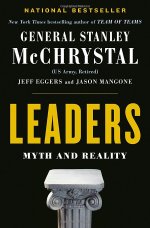Tight Lines
Senior Member
We don't have a good place to post this, but thought some others might enjoy this book. I just finished reading Leaders: Myth and Reality, after spending a couple of hours with Jeff Eggers (one of the co-authors) who was presenting to our team on leadership.
Jeff is a Navy SEAL of 20 years, and a Naval Academy graduate. Pretty interesting fellow in his own right.
If you've ever read Plutarch's Lives this is somewhat of a modern take on it, and explores the paradigms of leadership, including the conventional wisdom that a leader is the sole reason for a particular outcome. It explores the strengths and weaknesses of several leaders, as well as the context surrounding their particular situations.
In our in-person discussion, a leader not included in the book, Steve Jobs, was one of the topics of discussion. How could such an abrasive, seemingly egocentric human have created Apple, Next, and Pixar and been revered while doing it? The book helps answer that through context and evolution.
It's a long read, over 400 pages, and I enjoyed it. It makes me want to go back and re-read Lives which I read in high school. There are also several of the leaders included in the book that I want to read about further.
If you choose to read it, would be interested in your thoughts here.

Jeff is a Navy SEAL of 20 years, and a Naval Academy graduate. Pretty interesting fellow in his own right.
If you've ever read Plutarch's Lives this is somewhat of a modern take on it, and explores the paradigms of leadership, including the conventional wisdom that a leader is the sole reason for a particular outcome. It explores the strengths and weaknesses of several leaders, as well as the context surrounding their particular situations.
In our in-person discussion, a leader not included in the book, Steve Jobs, was one of the topics of discussion. How could such an abrasive, seemingly egocentric human have created Apple, Next, and Pixar and been revered while doing it? The book helps answer that through context and evolution.
It's a long read, over 400 pages, and I enjoyed it. It makes me want to go back and re-read Lives which I read in high school. There are also several of the leaders included in the book that I want to read about further.
If you choose to read it, would be interested in your thoughts here.

Last edited:


